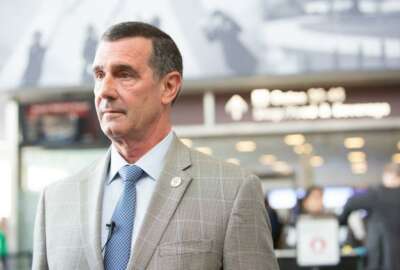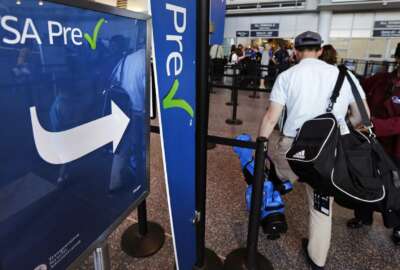White House proposes major pay raise for TSA screening workforce in 2023
The Biden is asking Congress to bring TSA employees pay and benefits in line with much of the rest of the federal workforce.
The White House is asking Congress to fund a major pay bump for tens of thousands of Transportation Security Administration employees, as part of a bid to bring salaries and benefits for TSA officers in line with much of the rest of the federal workforce.
The Biden administration’s fiscal year 2023 budget includes $9.7 billion for TSA, a $1.4 billion increase above 2022 appropriations.
The increase would help finance TSA’s pay equity plan, which aims to provide an average 30% increase in base pay for transportation security officers and an average 20% increase in base pay for federal air marshals, according to TSA.
The agency says other employees, including intelligence analysts, canine handers and non-screening administrative positions, would also see an increase in their base pay “commensurate with their federal colleagues.”
The average annual salary for transportation security screeners nationwide was $44,920 in May 2020, according to the latest available data from the Bureau of Labor Statistics, although wages vary across geographic regions.
If Congress approves the request, TSA Administrator David Pekoske said the agency would implement the pay plan within 90 days.
“One of the long-standing challenges at TSA has been the pay gap between TSA’s frontline workforce and their counterparts in the rest of the federal government,” Pekoske said in a statement released by TSA. “Equitable compensation and sufficient pay progression support TSA’s ability to meet mission requirements in the recruitment and retention of employees and positively impacts employee morale.”
With the new fiscal year starting on Oct. 1, the increased salaries could kick in as early as January 2023 if Congress agrees to fund the request. But that would also require lawmakers to reach an appropriations agreement on time, a rare occurrence in recent years.
The White House is proposing to offset the $1.5 billion increase to TSA’s budget through a legislative proposal that would allow the agency to keep all of the passenger security fees it collects, rather than sending a portion to the U.S. Treasury to reduce the federal deficit.
House Homeland Security Committee Chairman Bennie Thompson (D-Miss.) applauded the proposal and called on Congress to fully enact it.
“Under this proposal, TSA’s over 60,000 employees — who make up one of the lowest paid, most diverse workforces in the federal government — would finally get the pay they deserve after keeping our skies secure and manning the frontlines for over two years of a pandemic,” Thompson said in a statement. “Increasing pay and improving workplace rights will significantly help with morale and attrition at the agency and also improve and professionalize the workforce.”
Thompson also touted his “Rights for the TSA Workforce Act,” which would eliminate the special personnel authorities that currently govern workplace conditions for TSA employees and bring them under the Title 5 personnel system that applies to most other federal workers.
Increasing pay for its frontline workers has been TSA’s biggest challenge in its 20-year history, as the agency faces high attrition rates and low employee morale.
Last June, Homeland Security Secretary Alejandro Mayorkas directed TSA to expand collective bargaining rights for TSOs, negotiate an agreement to bring appeals before the Merit Systems Protection Board, and develop a plan to pay screeners in line with the General Schedule.
In September, TSA and the MSPB struck an agreement on the appeals process, allowing TSOs to appeal certain firings, demotions and long-term suspensions before the board.
Meanwhile, the American Federation of Government Employees is calling on TSA to expand collective bargaining for TSOs immediately, while TSA argues it needs additional resources to support an expanded labor framework.
The bulk of the proposed $1.5 billion budget increase for TSA in 2023, about $871 million, would go toward increasing pay and benefits for TSA employees.
Meanwhile, $121 million would “cover the cost of pay systems conversion, establish a labor relations support capability to manage expanded labor benefits for TSOs, and continue to support Merit Systems Protection Board (MSPB) appeal rights for TSOs,” according to TSA.
TSA is also looking to increase the TSO workforce by 2,540 positions to respond to an increase in air travel, requiring an additional $243 million in 2023.
The agency is also asking for an increase of $105 million for the Checkpoint Property Screening System program. Meanwhile, an extra $19 million would go toward the “On-Person Screening Algorithm Development,” which the agency says “will reliably and efficiently detect new and evolving threats to civil aviation in current property screening technology, while improving passenger experience and wait times,” the agency says.
Copyright © 2025 Federal News Network. All rights reserved. This website is not intended for users located within the European Economic Area.
Follow @jdoubledayWFED





